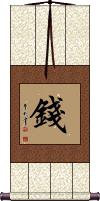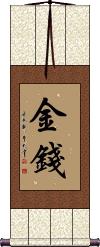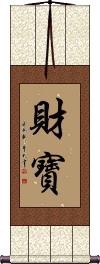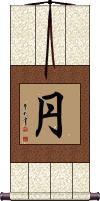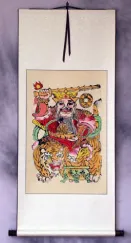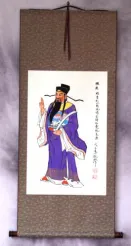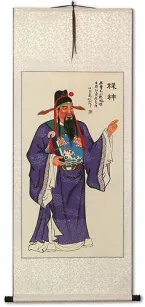Many custom options...
And formats...

Money in Chinese / Japanese...
Buy a Money calligraphy wall scroll here!
Personalize your custom “Money” project by clicking the button next to your favorite “Money” title below...
Money
錢 is the simplest way to say “money” in Chinese.
It can also mean cash, coins, or currency. It's also a surname, Qian, in China.
![]() This also means coins in old Korean Hanja and Japanese Kanji (though they use a slightly alternate form in Japan, as seen to the right). In both Japan and Korea, this can simply mean “one cent.”
This also means coins in old Korean Hanja and Japanese Kanji (though they use a slightly alternate form in Japan, as seen to the right). In both Japan and Korea, this can simply mean “one cent.”
![]() On the left side of this character is a radical, which means “gold” (or metal, depending on context).
On the left side of this character is a radical, which means “gold” (or metal, depending on context).
![]()
![]() On the right are two repeated radicals which currently mean “small” or “narrow” but used to kind of mean “tools” or “weapons.”
On the right are two repeated radicals which currently mean “small” or “narrow” but used to kind of mean “tools” or “weapons.”
It's a bit of a stretch, but you could suggest that money = “gold weapons” or “gold tools” in Chinese. Many Chinese people would argue otherwise depending on what they know of or the way they understand the etymology of the right side radical. I've seen some who say it means “industrialized gold,” but I take that to mean “raw gold turned into coins.”
Money / Wealth
金錢/金銭 means money, cash, currency, or wealth in Chinese, Japanese Kanji, and old Korean Hanja.
Literally, it means “gold coins” but has come to be used to mean money in general, as well as the idea of wealth.
![]() The second character of this word is written in a variant form in Japan. The more common version in Japan is shown to the right. Click on the Kanji to the right instead of the button above if you want this Japanese variant in your calligraphy.
The second character of this word is written in a variant form in Japan. The more common version in Japan is shown to the right. Click on the Kanji to the right instead of the button above if you want this Japanese variant in your calligraphy.
Time is Money
Treasure
財寶 is the Japanese word meaning “treasure” or “money and valuables.”
The first character means “property,” “money,” “wealth,” or “assets.” The second character means “treasure,” “wealth,” or “valuables” in Japanese. Together these two characters reinforce each other into a word that clearly means treasure in Japanese.
財寶 is also a word meaning “money and valuables” in Chinese but more of a daily use word - not as appropriate for a wall scroll if your audience is Chinese.
![]() The second character shown to the left is the ancient/traditional Japanese version. In modern Japan, this character has been simplified. This simplified version is shown to the right. If you want this modern Japanese/simplified version, just click the Kanji on the right, instead of the button above.
The second character shown to the left is the ancient/traditional Japanese version. In modern Japan, this character has been simplified. This simplified version is shown to the right. If you want this modern Japanese/simplified version, just click the Kanji on the right, instead of the button above.
Yen
Japanese Currency
円 is Yen, the Japanese currency.
円 is the Japanese variant of the original Chinese 圓 or 圆. It means circle, entirety, whole, full, or complete. It was the slang usage that became money, dough, or moola.
Occasionally, this is used as a given name or for other interesting uses. This version of the character is seldom used in Chinese unless referring to Japanese money.
Unless you have a specific reason to request it, this is a strange selection for a wall scroll.
This in-stock artwork might be what you are looking for, and ships right away...
Gallery Price: $108.00
Your Price: $59.88
Gallery Price: $108.00
Your Price: $59.88
Lu Xing
God Of Money & Prosperity
Wall Scroll
Discounted Blemished
Gallery Price: $71.00
Your Price: $39.00
Gallery Price: $61.00
Your Price: $33.88
Gallery Price: $61.00
Your Price: $33.88
These search terms might be related to Money:
Cash
Change
Men Die for Wealth, Birds Die for Food
Money / Wealth
Move on / Change Way of Thinking
Wealth / Fortune / Riches / Abundance
Wealth / Riches / Fortune
Wind of Change
Not the results for Money that you were looking for?
Below are some entries from our dictionary that may match your Money search...
| Characters If shown, 2nd row is Simp. Chinese |
Pronunciation Romanization |
Simple Dictionary Definition |
凱 凯 see styles |
kǎi kai3 k`ai kai tanoshi たのし |
More info & calligraphy: Kaye(given name) Tanoshi |
刀 see styles |
dāo dao1 tao tou / to とう |
More info & calligraphy: Katana(1) sword (esp. Japanese single-edged); katana; (2) (とう only) scalpel; (3) (とう only) (See 彫刻刀・ちょうこくとう) chisel; burin; graver; (4) (とう only) (See 刀銭) knife money (knife-shaped commodity money used in ancient China); (personal name) Tou sword |
礼 see styles |
reiji / reji れいじ |
More info & calligraphy: Respect |
花 see styles |
huā hua1 hua ririka りりか |
More info & calligraphy: Flower(1) flower; blossom; bloom; petal; (2) cherry blossom; (3) beauty; (4) blooming (esp. of cherry blossoms); (5) ikebana; (6) (abbreviation) Japanese playing cards; (7) (the) best; (female given name) Ririka 華 puṣpa, a flower, flowers; especially the lotus, and celestial flowers. 花座 The lotus throne on which buddhas and bodhisattvas sit. |
賽 赛 see styles |
sài sai4 sai sai さえ |
More info & calligraphy: Sae(abbreviation) dice; die; (1) (abbreviation) dice; die; (2) baton (of command) Money offerings. |
金 see styles |
jīn jin1 chin kin きん |
More info & calligraphy: Gold / Metal(1) gold (metal); (2) (See 金色) gold (color); (3) gold (medal); first place (prize); (noun - becomes adjective with の) (4) something of great value; something golden (e.g. silence); (5) money; gold coin; (6) (written before an amount of money) sum (of money); (7) (abbreviation) (See 金曜) Friday; (n,ctr) (8) karat (measure of purity of gold); carat; (9) (See 五行・1) metal (fourth phase of Wu Xing); (10) (hist) Jin dynasty (of China; 1115-1234); Chin dynasty; Jurchen dynasty; (11) (abbreviation) {shogi} (See 金将) gold general; (12) (abbreviation) (colloquialism) (See 金玉) testicles; (surname) Kimu; Kim hiraṇya, 伊爛拏 which means cold, any precious metal, semen, etc.; or 蘇伐刺 suvarṇa, which means "of a good or beautiful colour", "golden", "yellow", "gold", "a gold coin", etc. The Chinese means metal, gold, money. |
銀 银 see styles |
yín yin2 yin gin ぎん |
More info & calligraphy: Silver(1) silver (Ag); (noun - becomes adjective with の) (2) (See 銀色) silver (color); (3) silver (medal, prize, etc.); (4) (hist) silver coin; (5) (abbreviation) {shogi} (See 銀将) silver general; (suffix) (6) (abbreviation) (See 銀行) bank; (7) (archaism) money; (personal name) Ginji rūpya. Silver; money. |
錢 钱 see styles |
qián qian2 ch`ien chien chin ちん |
More info & calligraphy: Cien(out-dated kanji) (1) hundredth of a yen; (2) coin made of non-precious materials; (3) (obsolete) one-thousandth of a kan (as a unit of currency); (4) (archaism) one-thousandth of a kan (as a unit of mass); (surname) Chin coin |
布施 see styles |
bù shī bu4 shi1 pu shih fuho ふほ |
More info & calligraphy: Dana: Almsgiving and Generosity(n,vs,vi) (1) {Buddh} alms-giving; charity; (n,vs,vi) (2) {Buddh} offerings (usu. money) to a priest (for reading sutras, etc.); (surname) Fuho dāna 檀那; the sixth pāramitā, almsgiving, i. e. of goods, or the doctrine, with resultant benefits now and also hereafter in the forms of reincarnation, as neglect or refusal will produce the opposite consequences. The 二種布施 two kinds of dāna are the pure, or unsullied charity, which looks for no reward here but only hereafter; and the sullied almsgiving whose object is personal benefit. The three kinds of dāna are goods, the doctrine, and courage, or fearlessness. The four kinds are pens to write the sutras, ink, the sutras themselves, and preaching. The five kinds are giving to those who have come from a distance, those who are going to a distance, the sick, the hungry, those wise in the doctrine. The seven kinds are giving to visitors, travellers, the sick, their nurses, monasteries, endowments for the sustenance of monks or nuns, and clothing and food according to season. The eight kinds are giving to those who come for aid, giving for fear (of evil), return for kindness received, anticipating gifts in return, continuing the parental example of giving, giving in hope of rebirth in a particular heaven, in hope of an honoured name, for the adornment of the heart and life. 倶舍論 18. |
無心 无心 see styles |
wú xīn wu2 xin1 wu hsin mushin むしん |
More info & calligraphy: No Mind / Mushin(n,adj-no,adj-na) (1) innocence; (noun - becomes adjective with の) (2) {Buddh} (See 有心・2) mind free of obstructive thoughts; detachment; no-mind; (adj-no,n) (3) insentient; (noun, transitive verb) (4) pestering (someone for money, etc.); asking; begging; request Mindless, without thought, will, or purpose; the real immaterial mind free from illusion; unconsciousness, or effortless action. |
紅包 红包 see styles |
hóng bāo hong2 bao1 hung pao honbao; honpao ホンバオ; ホンパオ |
More info & calligraphy: Red Envelopered envelope (New Year's gift in Sinic cultures) (chi: hóngbāo) |
財寶 财宝 see styles |
cái bǎo cai2 bao3 ts`ai pao tsai pao zaihō |
More info & calligraphy: Treasureriches |
フール see styles |
puuru / puru プール |
(1) (swimming) pool; (2) pool (cue sport); (noun, transitive verb) (3) pooling (money, resources, etc.); (4) {econ} pool (price ring); (place-name) Poole (UK); Pool |
ロンダ see styles |
ronda ロンダ |
More info & calligraphy: Ronda |
カートン see styles |
gaadon / gadon ガードン |
(1) carton (e.g. of cigarettes); (2) tray (in which money is placed when paying); dish; (personal name) Garton; Gurdon |
ジャスト see styles |
jasuto ジャスト |
More info & calligraphy: Justo |
ばんばん see styles |
banban バンバン |
(adverb) (1) (onomatopoeic or mimetic word) with a bang bang (sound of a hammer or gunfire); (2) at a mad pace (spend money, work); with great vigor; (place-name) Bambang |
一刻千金 see styles |
yī kè qiān jīn yi1 ke4 qian1 jin1 i k`o ch`ien chin i ko chien chin ikkokusenkin いっこくせんきん |
More info & calligraphy: Time is Gold(expression) (yoji) every moment is precious; time is money; precious time |
時は金なり see styles |
tokihakanenari ときはかねなり |
More info & calligraphy: Time is Money |
也 see styles |
yě ye3 yeh mata また |
also; too; as well; (not ...) either; (used after a verbal or nominal expression X to indicate that X is an extreme or unexpected case) even (X); (literary) particle having functions similar to 啊[a5] (aux-v,vr,cop) (1) (kana only) (archaism) (equiv. of 〜だ、〜である) to be; (aux-v,vr) (2) (kana only) (archaism) (meaning 〜にある、〜にいる; usu. なる) (See なる・1) to be (at a location); (n,suf) (3) (indicates exact sum on a receipt, envelope, etc.) sum of money; (personal name) Mata and |
交 see styles |
jiāo jiao1 chiao kou / ko こう |
to hand over; to deliver; to pay (money); to turn over; to make friends; (of lines) to intersect; variant of 跤[jiao1] (1) association; fellowship; (2) change (of season, year, etc.); (personal name) Yoshimi Interlock, intersect; crossed; mutual; friendship; to hand over, pay. |
円 see styles |
yuán yuan2 yüan meguru めぐる |
yen (Japanese currency); Japanese variant of 圓|圆 (1) circle; (n,n-pref) (2) entirety; whole; full; complete; (3) (slang) money; dough; moola; (4) enclosure inside a castle's walls; (5) (ksb:) soft-shelled turtle; (suffix) (6) suffix for ship names; suffix for names of people (esp. infants); suffix for names of swords, armour, musical instruments, etc.; suffix for names of dogs, horses, etc.; (1) yen; Japanese monetary unit; (2) circle; (female given name) Meguru |
口 see styles |
kǒu kou3 k`ou kou kuchi くち |
mouth; classifier for things with mouths (people, domestic animals, cannons, wells etc); classifier for bites or mouthfuls (1) mouth; (2) opening; hole; gap; orifice; (3) mouth (of a bottle); spout; nozzle; mouthpiece; (4) gate; door; entrance; exit; (5) (See 口を利く・1) speaking; speech; talk (i.e. gossip); (6) (See 口に合う) taste; palate; (7) mouth (to feed); (8) (See 働き口) opening (i.e. vacancy); available position; (9) (See 口がかかる・1) invitation; summons; (10) kind; sort; type; (11) opening (i.e. beginning); (suf,ctr) (12) counter for mouthfuls, shares (of money) and stove burners; (suf,ctr) (13) (often read ふり in museum, etc. contexts) (See 振り・ふり・8) counter for swords, blades, etc.; (surname) Hamanoguchi mukha, the mouth, especially as the organ of speech. 身, 口, 意 are the three media of corruption, body or deed , mouth or word, and mind or thought. |
囊 see styles |
náng nang2 nang nō |
sack; purse; pocket (for money) A bag, sack, purse; translit. na. |
塊 块 see styles |
kuài kuai4 k`uai kuai saikachi さいかち |
lump; chunk; piece; classifier for pieces of cloth, cake, soap etc; (coll.) classifier for money and currency units (1) lump; mass; bundle; clump; clod; cluster; (2) group; crowd; (3) embodiment (of an idea, quality, feeling etc.); personification; (surname) Saikachi a clod |
墊 垫 see styles |
diàn dian4 tien |
pad; cushion; mat; to pad out; to fill a gap; to pay for sb; to advance (money) |
幣 币 see styles |
bì bi4 pi minematsu みねまつ |
money; coins; currency; silk (archaism) reward; present; gift; offering to the gods; (personal name) Minematsu |
懸 悬 see styles |
xuán xuan2 hsüan kakeru かける |
to hang or suspend; to worry; public announcement; unresolved; baseless; without foundation (suf,adj-no) (1) -clad; (2) (kana only) in the midst of; (3) tenths (e.g. wholesale price, as tenths of retail price); (4) times (i.e. multiplied by); (5) able-to-seat (of a chair, etc.); (1) (abbreviation) credit; (2) money owed on an account; bill; (3) (abbreviation) (kana only) hot noodles in broth; (n,n-suf) (4) proportion (of wholesale price, as tenths of list price); (suffix) (5) in the midst of; (6) rest; rack; hanger; (personal name) Kakeru Suspend, hang. |
戒 see styles |
jiè jie4 chieh kai; ingoto(ok) かい; いんごと(ok) |
to guard against; to exhort; to admonish or warn; to give up or stop doing something; Buddhist monastic discipline; ring (for a finger) (1) (かい only) {Buddh} admonition; commandment; (2) sila (precept) śīla, 尸羅. Precept, command, prohibition, discipline, rule; morality. It is applied to the five, eight, ten, 250, and other commandments. The five are: (1) not to kill; (2 ) not to steal; (3) not to commit adultery; (4) not to speak falsely; (5) not to drink wine. These are the commands for lay disciples; those who observe them will be reborn in the human realm. The Sarvāstivādins did not sanction the observance of a limited selection from them as did the 成實宗 Satyasiddhi school. Each of the five precepts has five guardian spirits, in all twenty-five, 五戒二十五神. The eight for lay disciples are the above five together with Nos. 7, 8, and 9 of the following; the ten commands for the ordained, monks and nuns, are the above five with the following: (6) not to use adornments of flowers, nor perfumes; (7) not to perform as an actor, juggler, acrobat, or go to watch and hear them; (8) not to sit on elevated, broad, and large divans (or beds); (9) not to eat except in regulation hours; (10) not to possess money, gold or silver, or precious things. The 具足戒full commands for a monk number 250, those for a nun are 348, commonly called 500. Śīla is also the first of the 五分法身, i.e. a condition above all moral error. The Sutra of Brahma's Net has the following after the first five: (6) not to speak of the sins of those in orders; (7) not to vaunt self and depreciate others; (8) not to be avaricious; (9) not to be angry; (10) not to slander the triratna. |
戥 see styles |
děng deng3 teng |
small steelyard for weighing money |
Click here for more Money results from our dictionary
The following table may be helpful for those studying Chinese or Japanese...
| Title | Characters | Romaji (Romanized Japanese) | Various forms of Romanized Chinese | |
| Money | 錢 / 銭 钱 | sen | qián / qian2 / qian | ch`ien / chien |
| Money Wealth | 金錢 / 金銭 金钱 | kin sen / kinsen | jīn qián / jin1 qian2 / jin qian / jinqian | chin ch`ien / chinchien / chin chien |
| Time is Money | 時は金なり | toki wa kane nari tokiwakanenari | ||
| Treasure | 財寶 财宝 | zaihou / zaiho | cái bǎo / cai2 bao3 / cai bao / caibao | ts`ai pao / tsaipao / tsai pao |
| Yen | 円 / 圓 円 / 圆 | yen | yuán / yuan2 / yuan | yüan |
| In some entries above you will see that characters have different versions above and below a line. In these cases, the characters above the line are Traditional Chinese, while the ones below are Simplified Chinese. | ||||
Successful Chinese Character and Japanese Kanji calligraphy searches within the last few hours...
